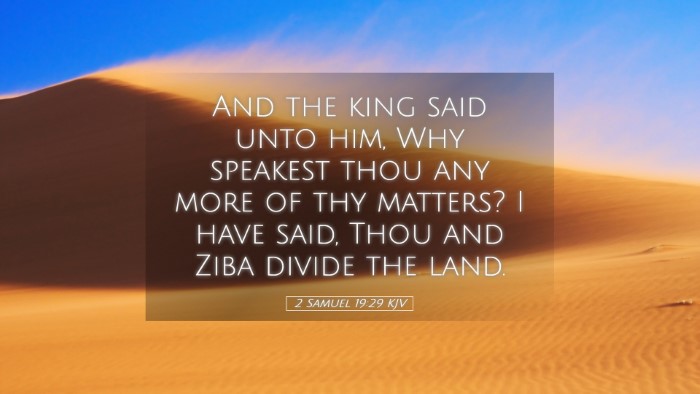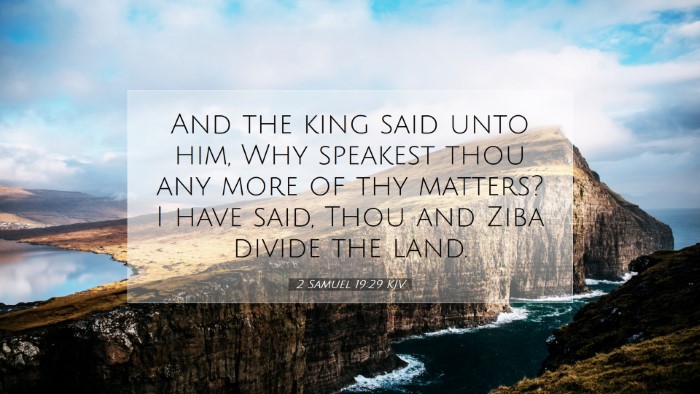Commentary on 2 Samuel 19:29
2 Samuel 19:29 states: "And the king said unto him, Why speakest thou any more of thy matters? I say, Thou and Ziba divide the land." This verse carries significant implications regarding leadership, justice, and the dynamics of loyalty in the context of David's reign. In order to provide a thorough understanding, we draw upon the insights of renowned biblical commentators including Matthew Henry, Albert Barnes, and Adam Clarke.
Contextual Background
The verses surrounding 2 Samuel 19 reflect critical moments during King David's life, specifically involving the aftermath of Absalom's rebellion. David had fled Jerusalem, and upon his return, numerous issues of loyalty and inheritance arose. The interactions between David, Ziba, and Mephibosheth demonstrate the complexity of these relational dynamics.
Insights from Matthew Henry
Matthew Henry emphasizes the need for integrity in leadership. He notes that David's decision to divide the land between Ziba and Mephibosheth encapsulates a moment of judgment reflecting the chaos sown during Absalom's rebellion. Ziba had falsely accused Mephibosheth of treason, claiming the latter had intended to usurp the throne. Thus, Henry reminds readers that appearances can be misleading, and that discernment is essential in leadership.
- Divine Justice: Henry discusses how this incident illustrates the complexities of divine justice. David, faced with conflicting reports, chose a middle ground that can be interpreted as a recognition of the importance of equity even in the face of unclear allegations.
- Loyalty and Betrayal: The commentator elaborates on themes of loyalty, suggesting that Ziba's duplicity serves as a warning about the potential for betrayal, even amongst those closest to the leader.
Insights from Albert Barnes
Albert Barnes provides a detailed examination of the political maneuvering inherent in this verse. He notes that David's command to "divide the land" reflects his pragmatic approach to governance during a tumultuous period. Barnes brings attention to the fact that the king's decision to share the estate signifies both a compromise and a recognition that both parties had claims, albeit under dubious circumstances.
- Practical Leadership: Barnes suggests that the scenario illustrates the nature of wise leadership, where compromise is necessary for stability within the kingdom.
- Social Reconstruction: The division of land symbolizes the need for reconstruction within Israel after the conflict. It acknowledges that both Ziba and Mephibosheth had roles to play in the nation’s restoration.
Insights from Adam Clarke
Adam Clarke offers a theological lens through which to view this verse. His commentary suggests that the actions taken by David were not merely administrative but also deeply rooted in the moral fabric of the society he governed. Clarke emphasizes the importance of loyalty to the king and the implications of Ziba's deception.
- Ziba's Integrity: Clarke points out that Ziba’s opportunism raises serious questions about his character. The failure to trust entirely in David's judgment is underscored as a risk inherent in leadership roles.
- God's Sovereignty: In Clarke's view, this passage reinforces the concept that God remains sovereign even amid human deceit and failure, ultimately orchestrating outcomes for His purposes.
Theological Implications
The insights garnered from these commentaries illustrate profound theological implications for contemporary audiences. Leaders, whether in spiritual or secular realms, can derive meaningful lessons regarding discernment, integrity, and the need for trusting relationships amidst chaos.
- Discerning Truth: The text challenges leaders today to seek truth diligently and to be wary of misinformation that can lead to hasty conclusions.
- Justice and Equity: The balance between justice and equity remains relevant, as leaders must strive to uphold principles that serve the common good, particularly in times of crisis.
- Understanding Human Nature: The duplicity seen in Ziba reminds leaders of the complexities of human nature and the necessity to navigate relationships with wisdom and care.
Conclusion
In summation, 2 Samuel 19:29 presents a rich tapestry of leadership lessons through its historical and relational complexities. Drawing from the commentaries of Matthew Henry, Albert Barnes, and Adam Clarke provides a multidimensional understanding, essential for pastors, Bible scholars, and theologians. The ongoing relevance of these themes enriches our understanding of leadership, justice, and the moral responsibilities that accompany authority.


